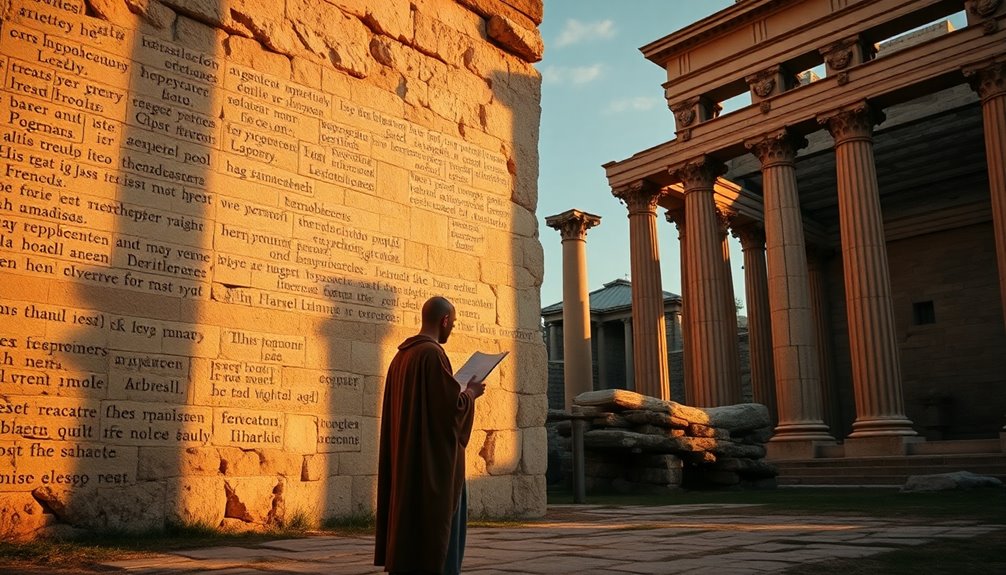Paul, originally Saul of Tarsus, is a key figure in the Bible whose journey reshaped Christianity. He started as a Pharisee vehemently opposing Christians but underwent a dramatic conversion on the road to Damascus. This led him to become a missionary, spreading the Gospel especially to Gentiles and establishing many early churches. Paul authored 13 letters in the New Testament, emphasizing faith and the unity of believers. His teachings continue to influence Christian beliefs and practices today. There's much more to explore about his life, struggles, and enduring impact on the faith that can deepen your understanding.
Key Takeaways
- Paul, originally named Saul, was a Roman citizen and Pharisee who initially persecuted early Christians before his dramatic conversion.
- He became a key figure in spreading the Gospel to Gentile communities through three major missionary journeys.
- Paul authored 13 letters in the New Testament, emphasizing salvation through faith and the unity of the Church as the Body of Christ.
- His writings often address the relationship between Jewish customs and faith in Christ, aiming to reconcile Jewish and Gentile believers.
- Paul's teachings on ethical living and spiritual growth continue to influence Christian beliefs and practices today.
Introduction

While many figures in the Bible are well-known, few have had as profound an impact on Christianity as Paul. Originally named Saul, he was born in Tarsus around 5 AD. As a Roman citizen and a Pharisee from the tribe of Benjamin, Saul initially persecuted early Christians, zealously hunting them down and imprisoning them.
His life took a dramatic turn on the road to Damascus between 31-36 AD, where he encountered Jesus in a transformative moment that redefined his mission.
After this conversion, you'd find Paul embarking on three major missionary journeys, spreading the gospel of Jesus Christ to Gentile communities across Asia Minor and Europe. His dedication led to the establishment of numerous churches and the inclusion of Gentiles in the faith without requiring adherence to Jewish law.
Paul is also credited with writing 14 letters in the New Testament, with seven considered authentic, including Romans and Corinthians. These letters significantly shaped early Christian theology by emphasizing salvation through faith in Jesus.
Paul's journey from persecutor to apostle highlights his crucial role in the development of Christianity as we know it today.
Scriptural Basis for Paul

When exploring Paul's role in the Bible, you'll find a wealth of primary and secondary references that highlight his significance.
Key passages in Acts and his epistles showcase his transformation and theological insights.
Primary Bible References
Often considered one of the most influential figures in early Christianity, Paul's life and ministry are rooted in several key biblical passages. Initially known as Saul, he appears in Acts 7:58 as a witness to Stephen's stoning, marking his early opposition to the faith. His transformation begins in Acts 9:1-22, where he's a life-changing encounter with Jesus on the road to Damascus, resulting in temporary blindness and his baptism by Ananias.
Paul goes on to embark on three major missionary journeys, as documented in Acts 13-21. During these journeys, he spreads the Gospel primarily to Gentiles in regions like Asia Minor and Greece, establishing numerous churches and nurturing the early church.
Alongside his travels, Paul is credited with writing 13 letters in the New Testament, including Romans and Corinthians. These letters address various theological issues and offer teachings on Christian faith and practice.
His identity as a Roman citizen plays a crucial role in his ministry, highlighted in Acts 22:22-29 when he successfully argues against unlawful punishment.
Paul's dual identity enriches his mission and outreach efforts throughout the early church.
Secondary Bible References
Throughout his ministry, Paul's identity and mission are underscored by significant biblical references that illustrate his transformation and purpose. Initially known as Saul of Tarsus, he first appears in Acts 7:58, witnessing the stoning of Stephen and actively participating in the persecution of Christians.
However, his life changes dramatically on the road to Damascus, as detailed in Acts 9:1-22, where he encounters Jesus, experiences temporary blindness, and receives a divine calling to preach the Gospel.
As he begins his missionary journeys, Saul is referred to as Paul in Acts 13:9, marking the start of his pivotal work among the Gentiles. His epistles, like Romans 1:16 and Galatians 2:8, highlight his mission to spread the Gospel and establish foundational Christian doctrines, including justification by faith.
In 1 Corinthians 15:9-10, Paul reflects on his past persecution of the church, acknowledging his unworthiness as an apostle and celebrating God's grace that transformed him into a devoted missionary.
These secondary references collectively affirm Paul's significant role in early Christianity and his enduring legacy as a theologian and evangelist.
Roman Empire's Influence on Judaism

The Roman Empire's dominance over Judea dramatically reshaped Jewish society, leading to a complex interplay of governance, culture, and religion.
Beginning in 63 BC, when Pompey captured Jerusalem, Roman rule introduced local client kings, like Herod the Great, who tried to balance Roman interests with Jewish traditions. However, the presence of Roman soldiers often intensified tensions, as many Jews resented foreign occupation and the imposition of Roman culture and religion.
Despite these challenges, the Pax Romana facilitated the spread of ideas and trade, allowing increased interaction between Jewish and Gentile communities. This environment significantly influenced early Christianity, providing a fertile ground for the movement to grow.
The legal structure of the Roman Empire offered citizenship rights that enabled early Christian missionaries, including Paul, to travel widely and spread their message throughout the Mediterranean. The decentralized nature of early Christian communities allowed for diverse expressions of faith amidst the Roman influence.
As Paul ventured into Gentile communities, he navigated the complexities of Roman governance while promoting his beliefs, ultimately shaping the trajectory of early Christianity.
Thus, the Roman Empire's influence on Judaism and its evolution during this period was pivotal in laying the groundwork for the religious landscape that followed.
Paul's Theological Contributions Explained

Paul's theological contributions dramatically shaped early Christianity, especially in how he framed the relationship between faith and salvation. He emphasized that salvation comes through faith alone, arguing that Gentiles don't need to adhere to Jewish law to be saved. This radical idea is vividly illustrated in his letters to the Galatians and Romans, where he underscores grace as God's unmerited favor leading to salvation.
In his teachings, Paul established the concept of the Church as the Body of Christ, highlighting the unity and diversity among believers. This is particularly evident in 1 Corinthians 12, where he describes how each member plays a vital role.
His high Christology presents Jesus as the pre-existent divine Son of God, as seen in the profound Christological hymn in Philippians 2:6-11.
Moreover, Paul laid the groundwork for ethical living within the Christian community, emphasizing principles like love and forgiveness. His insights into the fruit of the Spirit in Galatians 5:22-23 shaped moral conduct for generations.
Through these teachings, Paul profoundly influenced the identity and mission of the Church.
Misunderstanding Paul's Jewish Roots

When you explore Paul's life, it's easy to misunderstand his Jewish roots and the cultural context in which he operated.
Many people overlook how deeply his Pharisaic background influenced his theology and mission.
Let's clear up some common misconceptions about his identity and its significance in the early church.
Debunk Common Misconceptions
Many people misunderstand Paul's Jewish roots, assuming he abandoned his heritage for a new faith. In reality, Paul, originally named Saul, was born into a Pharisaic Jewish family and belonged to the tribe of Benjamin. His education under Gamaliel, a renowned rabbi in Jerusalem, reinforced his deep commitment to Jewish law.
While he became known as the Apostle to the Gentiles, Paul never discarded his Jewish identity. Instead, he consistently identified himself as a Jew, as seen in his letters and actions.
Before his conversion, Paul's fervent persecution of Christians was motivated by his dedication to protecting Judaism from what he viewed as heretical threats. His teachings, while groundbreaking in their embrace of Gentiles, were rooted in Jewish Scriptures, showcasing his continuity with Jewish traditions.
Paul's mission wasn't to negate his heritage but to reveal how the Jewish faith fulfilled its promises through Jesus. Understanding this context helps clarify that Paul's identity and his revolutionary teachings were deeply intertwined with his Jewish roots, rather than a rejection of them.
Cultural Context Misunderstandings
Understanding the cultural context of Paul's writings is essential to grasping his true message and intent. Paul, originally a Pharisee, had deep roots in Jewish tradition and law. Raised in a Pharisaic household and educated by Rabbi Gamaliel, he understood Jewish customs intimately.
However, his mission focused primarily on Gentiles, emphasizing faith in Christ over strict adherence to Jewish law. This focus often leads to misinterpretations of his relationship with Judaism.
Many view Paul solely as an anti-Jewish figure, overlooking his commitment to Jewish customs and teachings. His writings frequently bridge the gap between Jewish and Gentile believers, using Hebrew scriptures to show Jesus as the fulfillment of messianic prophecies. By doing this, Paul aimed to reconcile followers of Christ from both backgrounds.
When you read Paul's letters, it's crucial to remember his Jewish heritage. His arguments about faith and law aren't a rejection of Judaism but rather a redefinition of what it means to follow God's covenant in light of Christ.
Recognizing this context helps dispel misunderstandings and appreciate the depth of Paul's contributions to early Christianity.
Faith in Daily Life

When you think about faith in your daily life, consider how Paul's teachings can guide your decisions and actions.
He encourages you to see every moment as an opportunity to reflect your beliefs, whether at work or in relationships.
Engaging with your church community can also strengthen your faith and help you make choices that align with your values. Additionally, practicing emotional intelligence fosters deeper connections and helps you navigate daily interactions with grace and understanding.
Faith-Driven Decision-Making Guidance
Faith-driven decision-making is at the heart of living a life guided by Christ. Paul the Apostle emphasizes this throughout his letters, encouraging you to rely on your relationship with Christ for daily guidance. In Philippians 4:6-7, he reminds you to seek God's direction through prayer, highlighting its importance in making faith-driven choices.
Paul teaches that you shouldn't conform to the world but should be transformed by renewing your mind, as noted in Romans 12:2. This transformation leads to divine wisdom, crucial for navigating life's complexities.
By sharing personal testimonies, Paul illustrates how his faith experiences shaped his decisions and encouraged others to trust in God's plan (2 Corinthians 1:9). His teachings on suffering reveal that challenges can be opportunities for spiritual growth (Philippians 1:29-30).
Embracing these challenges allows you to deepen your faith and better discern God's will. Remember, each decision you make can reflect your faith and relationship with Christ, guiding you toward a purposeful and fulfilling life. Additionally, just as one might plan ahead for travel safety, planning ahead can enhance your spiritual journey by preparing you for life's uncertainties.
Through prayer and reliance on divine wisdom, you can face life's challenges with confidence and clarity.
Practical Church Engagement Strategies
Incorporating faith into daily church engagement can transform both individual lives and the community. By actively participating in community service initiatives, you embody the love of Christ in practical ways, just as Paul urged in Galatians 5:13-14.
Hosting small group discussions or Bible studies can replicate Paul's mentoring approach, helping early Christians grow in their faith, much like his letters to the Corinthians and Thessalonians.
Don't underestimate the power of personal testimonies in your church gatherings. Sharing your transformative encounter with Jesus can inspire others to deepen their faith, following Paul's example in Acts 22:1-10.
Utilize social media platforms for outreach, echoing Paul's missionary journeys. This allows you to spread the Gospel message far and wide, reaching diverse audiences as he did through his letters.
Encouraging fellow church members to engage in prayer and fasting can lead to powerful ministry decisions. Just as the early church sought God's guidance before sending out missionaries in Acts 13:2-3, you too can foster a spirit of discernment and unity within your community.
Paul's Lasting Theological Impact

Many scholars agree that Paul's theological impact has been profound and enduring in Christianity. His letters, which include foundational teachings, emphasize concepts like justification by faith, reshaping early Christian thought. You'll find that Paul's arguments for salvation accessible to Gentiles opened the doors of faith to many, breaking down barriers within the Church.
Paul introduced the concept of the Church as the Body of Christ, highlighting the unity and diversity of believers. This idea has influenced ecclesiology throughout history and shaped how you understand community in faith.
His high Christology, especially in Philippians 2:5-11, deepened the early understanding of Jesus' divine nature and his role in salvation, encouraging the worship of Christ alongside God the Father.
Moreover, Paul's teachings on ethical living, detailed in letters like Romans and Corinthians, continue to guide Christian moral principles today. His insights on the role of the Holy Spirit further enriched your understanding of spiritual life.
Ultimately, Pauline authorship of these letters ensures that his theological contributions remain vital, echoing through centuries of Christian belief and practice.
Additional Resources

To deepen your understanding of Paul and his contributions to early Christianity, a variety of resources are available. You can explore "The Complete Book of Who's Who in the Bible" by Comfort & Elwell for detailed insights into the Apostle Paul's life and his teachings.
For a more interactive approach, consider using Logos Bible Software, which offers extensive Bible study tools, commentaries, and resources focused on Paul's letters and theology.
Online courses from the Bart Ehrman community, such as "Paul and Jesus™: The Great Divide," delve into Paul's role in the early church and the mission to the Gentiles. Additionally, free courses like "Why I Am Not a Christian" attract many learners interested in discussions related to Paul and early Christianity.
Numerous articles and resources are also available for you to further explore Paul's life events, teachings, and his profound impact on Christian thought and doctrine.
Frequently Asked Questions
Who Is Paul in the Bible and What Did He Do?
When you explore Paul's life, you find a fascinating journey of transformation.
He started as a Pharisee, persecuting Christians, but then had a profound encounter with Jesus that changed everything.
After this, he became a dedicated apostle, traveling extensively to spread the message of Christ.
You'll notice he wrote many letters that shaped early Christian beliefs, emphasizing faith over law and welcoming Gentiles into the faith, making him a pivotal figure in Christianity.
Is Paul an Apostle or Disciple?
You might wonder if Paul is an apostle or a disciple.
Paul's role is that of an apostle, not a disciple. Unlike the original disciples who followed Jesus during His life, Paul encountered the risen Christ after the resurrection.
This experience commissioned him as an apostle, specifically to the Gentiles. His letters affirm his authority and mission, distinguishing him as a foundational figure in early Christianity rather than just a follower.
Why Is Paul so Important in the Bible?
Paul's importance in the Bible stems from his transformative experiences and influential writings.
You'll find that he played a pivotal role in spreading Christianity beyond Jewish communities, reaching Gentiles and establishing churches across diverse regions.
His letters, which address theological issues and practical living, shape Christian doctrine today.
Who Was Paul Before He Met Jesus?
Before he met Jesus, you'd find Paul, known as Saul, as a fervent Pharisee who passionately persecuted early Christians.
He believed he was defending Jewish law, even consenting to the stoning of Stephen. Educated under Rabbi Gamaliel, he'd a strong grasp of scripture.
As a Roman citizen from Tarsus, he spoke multiple languages, which helped him navigate diverse communities while seeking to imprison those he viewed as threats to Judaism.










